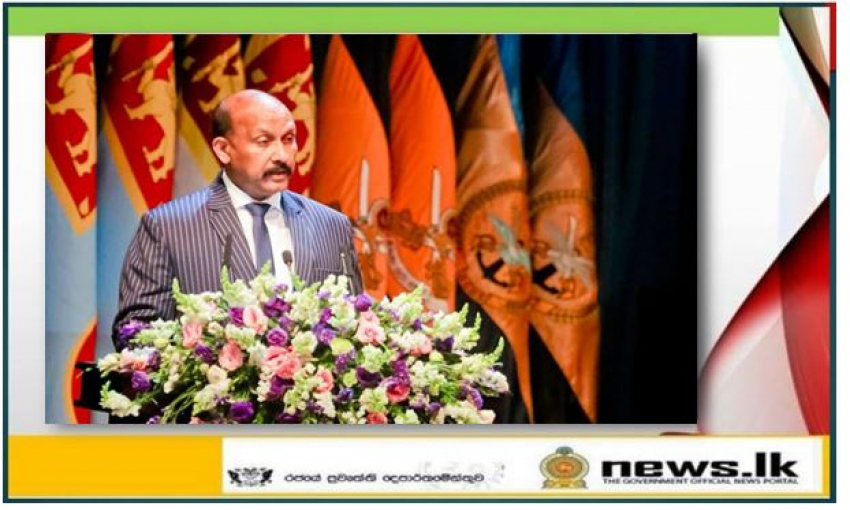This 'Armed Forces' Middle-Grade Officers' Leadership Symposium'(AFMOLS-2021), designed to develop and exhibit character with a combination of leadership traits and
values and attributes that enables an Officer to see what to do, decide to do, and influence others to follow in order to be competent in the knowledge and skills while effectively
accomplishing the entrusted mission as a leader, was attended by 300 plus middle-grade Officers of the Army, Navy and Air Force.
At the invitation of General Shavendra Silva, Chief of Defence Staff and Commander of the Army, the Secretary to Ministry of Defence, General Kamal Gunarathna (Rtd) as the
Chief Guest graced the inauguration and delivered the keynote address. Lighting of the traditional oil lamp jointly by the Chief Guest, Chief of Defence Staff and Commander of the
Army, Navy and Air Force Commanders, few distinguished guests and representative Tri service attendees set the stage for observance of the customary two-minute silence in
memory of fallen War Heroes. A documentary video screened afterwards narrated the synopsis of the objectives of the whole symposium and its composition with scholarly inputs
throughout the day.
The Chief of Defence Staff, General Shavendra Silva, the brainchild behind the project's implementation delivered the welcome note, in which he highlighted importance of
formulating policies and conducting joint training to ensure that the Armed Forces are rightly equipped with optimal operational capabilities. "Our Armed Forces have always been
at the forefront of fostering peace, security and prosperity of our country amidst many turbulent environments. This proven capacity and capability have made a point that our
Armed Forces are called upon to assist the nation whenever the country is at stake, irrespective of the nature of the challenge. Therefore, keeping our forces ready with competent
and confident commanders at all levels is of utmost priority to employ them across the gamut of the conflicts to foster enduring national security, " he said.
"If we are to produce a generation of leaders capable of operating in the complexities of the modern security environment, we must introduce innovative training programmes
across a range of disciplines around analytical and critical thinking, cooperative learning, mentoring, case studies and simulations. Thereby, they will develop themselves to think
and make high-quality decisions and maintain collaboration with civil society appropriately. A premium must be placed on leader development and decision-making. In that sense,
the Office of the CDS wanted to create this interactive learning experience for the tri-forces Middle-Grade Officers on Military Leadership in the Contemporary World in order to
transform military leadership to effectively manage contemporary national requirements. Equally, it sets the ground for extremely profitable intellectual investment for the tactical
level commanders to reinforce professional military knowledge with a personal understanding that would multiply overall proficiency in their discharge of duties," he pointed out.
He went on: " The theme has been arranged to explore, discover and construct the characteristics that a modern-day military leader must possess in executing his tasks going
beyond the primary role. The Office of Chief of Defence Staff is much more privileged enough to interact with some of the finest and eminent scholars to kindle our intellectuality
as well as to exchange their understanding and share the different schools of thoughts on this most timely topic to accomplish our overall aim of shaping the middle-grade officers
as leaders of the 21st century. Over the years, we have well understood that the security paradigm in the world has transformed and is ever-changing, and consequent to the global
complexities, the security environment of our country has also been in a continuous change. We need to address the changing facets of the operational environment and I always
rely upon "the reliance on the likelihood of the enemy's or its failure should not be the cause for the preparedness of own forces".
" It is apparent, the future operations seem to be launching mostly over cross-domains, unlike in the past where the tactical commanders of our forces need to shift their role
accordingly, from a warrior to a humanitarian assistant provider reflecting the capability of cooperating with civilians, other law enforcement agencies and the line ministries, "
General Shavendra Silva said.
General Kamal Gunarathna (Rtd) in his keynote address to the inaugural session congratulated General Shavendra Silva, Chief of Defence Staff and Commander of the Army for
arranging this symposium of exceptional nature. "The three sessions in the symposium would shed light on many relevant areas, related to the progression of the career of an
officer as it is the leadership that steers middle-grade officers and grooms them to be future leaders. Deliberations and strategic learning practices should be a continuing process
for middle-grade Officers for enhancement of their horizons of knowledge and skills. Leadership and its implications are integral and absolutely necessary for future leaders " he
said. He also congratulated participating tri service middle-grade officers and wished them good luck for their distinctive military careers.
Towards the end of the keynote address, General Shavendra Silva awarded a special memento to the day's Chief Guest, General Kamal Gunarathna (Rtd) in appreciation of his
contribution to the day's forum. After leaving a few thoughts in the visitors' book, the Secretary Defence sat for a group photo with those participants, bringing ceremonial
inaugural session to end.
Today's 'Armed Forces' Middle-Grade Officers' Leadership Symposium' during its three main sessions under thematic "Military Leadership in the Contemporary World: Evolving
from a Warrior to a Friend in Need" is scheduled to discuss and focus largely on sub-themes, like the 'Re-Defining Traditional Role and Task of the Military in National Security',
'Evolution of Military Leadership: Applicability of Traditional Leadership Traits in the Contemporary World', Effective Decision Making to ensure National Security: Empowering
Military Leadership', ' Emerging Role of Military Leadership in Contemporary Operational Environment', Ideal Military Leadership Model desired by Sri Lankan Society,' 'Current
and Emerging Threats in Sri Lanka: Role of a Junior Military Leader,' 'Military Mindset: Professional Approach to Military Leadership,' 'Military Leadership Development to
Improve the Image within the Society,' and 'Need of Resilient Leader to Resolve Current Military Challenges'.
Dr Sanath De Silva, Senior Lecturer, Department of Strategic Studies, Faculty of Defence and Strategic Studies at General Sir John Kotelawela Defence University, Rear admiral
Y.N Jayarathne, Chief of Staff of the Sri Lanka Navy, Mr Nilanthan Niruthan, Defence Analyst, Mr H.M.G.S Palihakkara, former Governor of the Northern Province, Dr Manisha
Wanasinghe Pasquel, Head of the Department of International Relations, Faculty of Arts, University of Colombo, Major General T.S Salley, Director General State Intelligence
Service, Dr Harinda Vidanage, Head of the Department of Strategic Studies, General Sir John Kotelawala Defence University, Dr George Cook, Senior Lecturer, Department of
International Relations, Faculty of Arts, University of Colombo and General Daya Rathnayake (retd), Secretary to Ministry of Industries and former Commander of the Army are
among distinguished scholars contributing to the sessions.
Major General Ajith Dissanayake, Chief of Staff at the OCDS delivered the vote of thanks before symbolic mementos were presented to all scholars and certificates to those
participating in the sessions.
This Symposium also aims to pave the way for an interactive learning experience on areas of Military Leadership in the Contemporary World with the vision of transforming
military leadership to effectively manage contemporary national requirements, a task that is of paramount importance to tactical commanders in discharging their duties. The
carefully sequenced presentations, panel discussions and participant-oriented group discussions would help optimize the discourse on those thematic subjects.




















